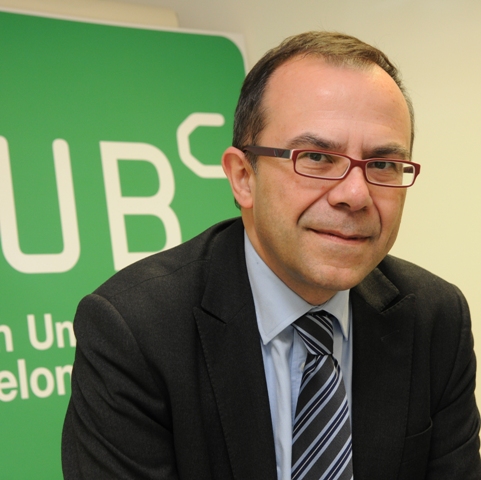“The Medicine of the future, regenerative therapies, and active ageing, the main topics in Bioengineering which are being developed thanks to the Severo Ochoa Award for Excellence”

Interview with JOSEP SAMITIER
Director of the Institute of Bioengineering of Catalonia (IBEC)
“Our Communications and outreach activities will include ‘IBEC Ambassadors’, an initiative in which doctoral students visit their old schools to talk about their experiences at the IBEC”.
The Institute of Bioengineering of Catalonia (IBEC) was created in 2005 by the Department of Innovation, Universities and Companies and the Department of Health of the Autonomous Government (The “Generalitat”) of Catalonia, the University of Barcelona (UB) and the Polytechnic University of Barcelona (UPC). It is a multidisciplinary centre, which has received the Severo Ochoa Award of Excellence. Its director, Josep Samitier, was a participant in the “100XCIENCIA” forum. In his opinion “ The Severo Ochoa award marked a milestone in the development and consolidation of the IBEC and confirms a success which began only a few years ago, when the research groups of the UPC and the UB joined forces in the field of bioengineering”. As well as a recognition of the work carried out until now, he believes that the Severo Ochoa award has been a strong impulse for the future of the Institute. “It will allow us” he says “to carry out our Strategic Plan, 2015-2018, with an ambitious programme of research in bioengineering which will achieve significant results in three key areas: the medicine of the future, regenerative therapies, and active ageing”.
Samitier adds that this award of excellence will allow them to perform a full series of critical activities at an institute which has to compete world-wide, such as attracting international talent, offering an interesting professional training and careers for the researchers, and pushing the transfer of their results to industry and to the clinical environment, as well as reaching out to society.
The basic objective of the IBEC is to carry out high quality research at the frontiers of knowledge, and to combine this with specific objectives of (technology) transfer, to produce new applications which may be used in life science and in health. “Early diagnosis, new therapies based on regenerative medicine, improving the quality of life for an ageing population, and improved technologies for improving the efficiency of health care, and making it sustainable, are clear examples of areas where a research institution such as the IBEC can contribute with its frontier research, and by generating new technological advances which can be then implemented commercially”, explained Josep Samitier. “Because of its history and its capacity the Institute has the versatility to create excellent research, and at the same time to collaborate with the health services and with industry to develop new systems for diagnostics and treatment. With these collaborations we can achieve a stable financial model and a connection with the needs of industry which we could not manage on our own”.
The Plan for Communications of the IBEC, which is an integral part of the new IBEC strategy for 2014-2017 has as its main objective to show that the institute is a centre of scientific excellence, presenting it as an attractive place to work for the best researchers in the world at all stages of their career, to achieve a higher level of visibility in the communications media, both nationally and internationally, and to provide information about the services and products it can offer to industry and to the hospitals.
“Our communications and outreach activities, made possible by the Severo Ochoa award, will include the ‘IBEC Ambassadors’ initiative, whereby doctoral students will go back to their old schools to talk about their experience in the IBEC, and giving a view of the life of a scientist” states the director of this multidisciplinary centre. As well as this, there will be open days for journalists, and a long list of web-based facilities such as images, opinions by experts, and a series of videos for different sectors of the public, stressing possibilities of collaboration”.
Coordination of interviews: Verónica Martín




